Construction Manager Resume Guide: Examples & Pro Tips

Jul 18, 2024
|
12 min read
Build the perfect Construction Manager resume with our expert-backed tips.
Rated by 348 people
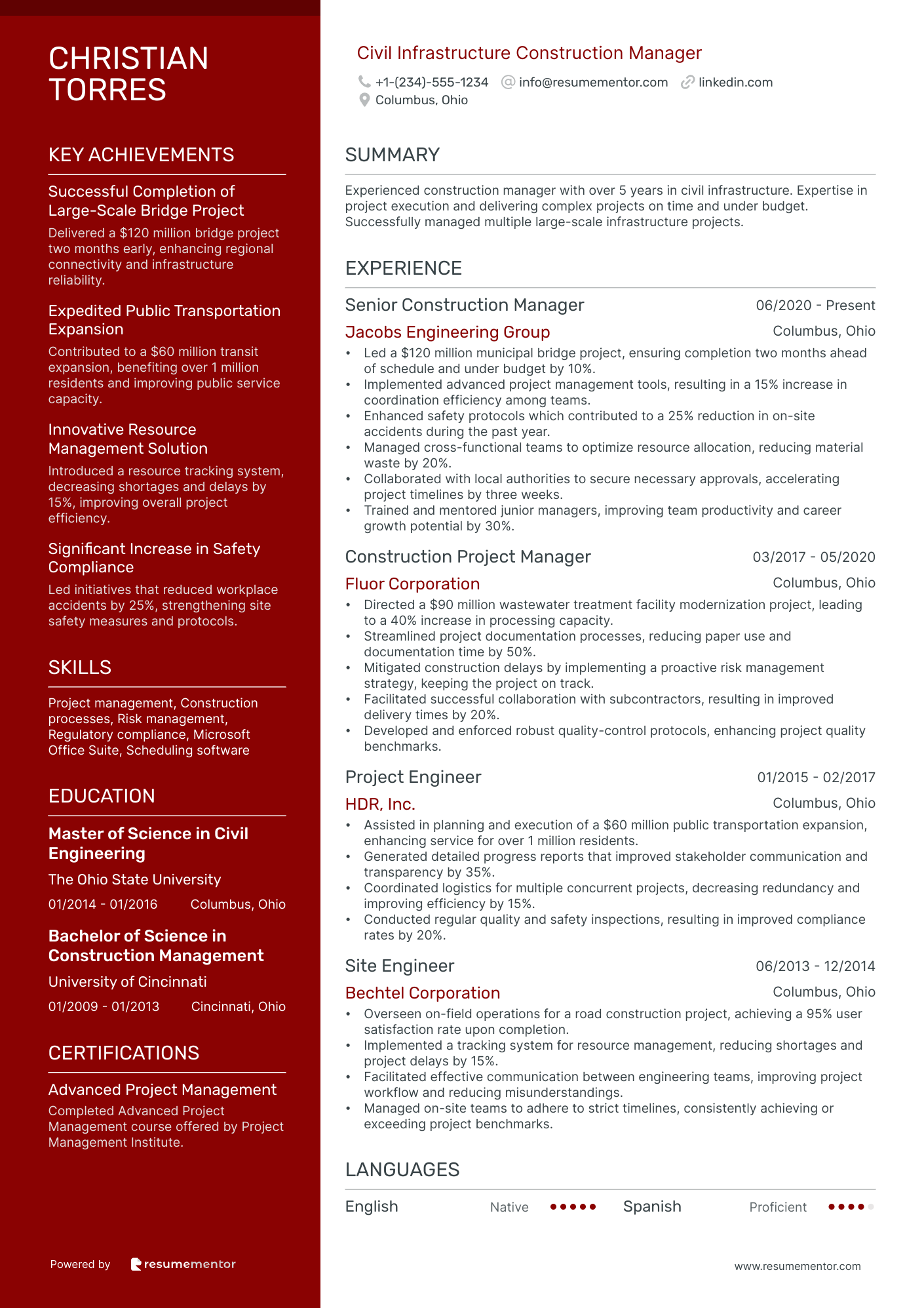
Civil Infrastructure Construction Manager
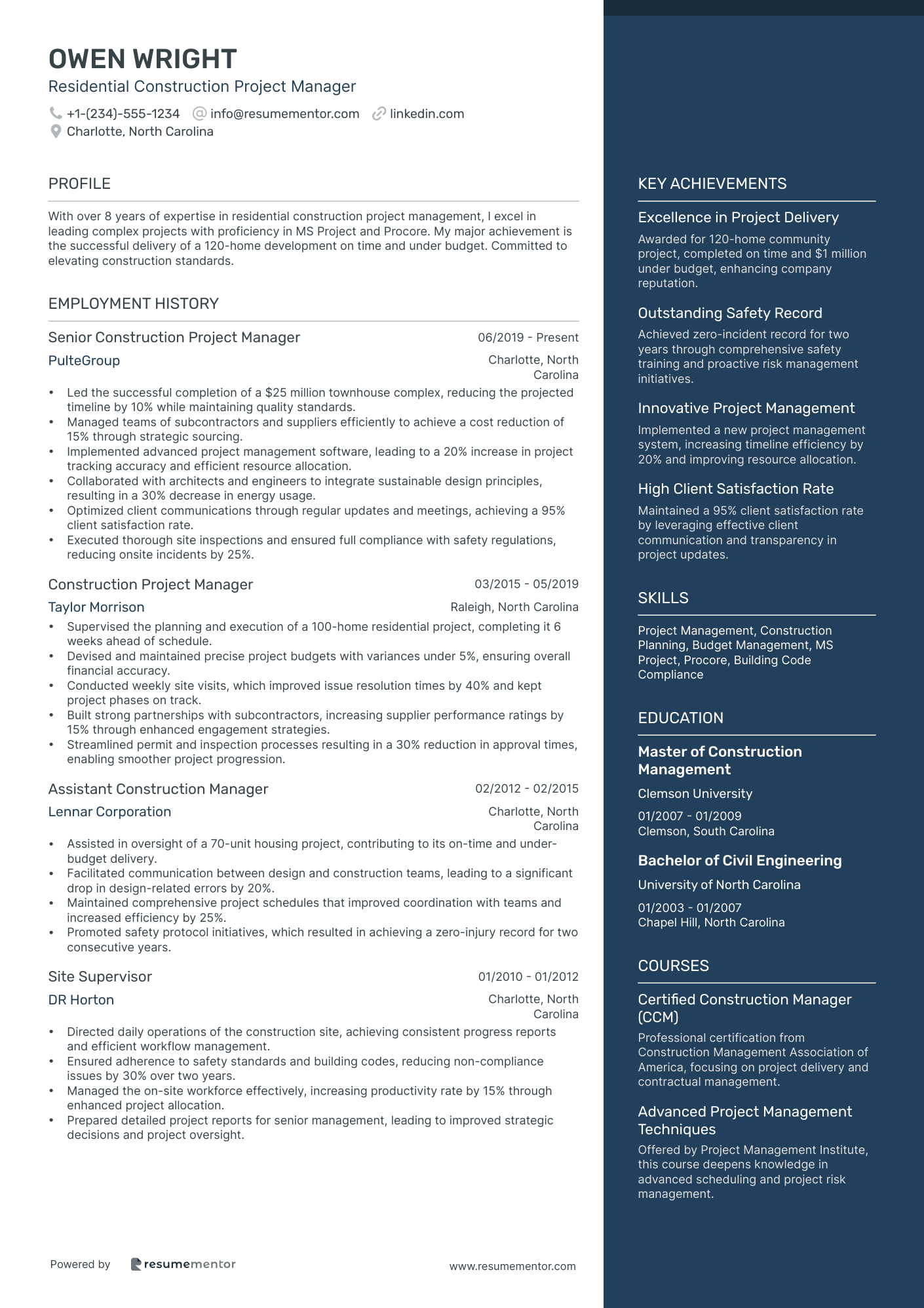
Residential Construction Project Manager
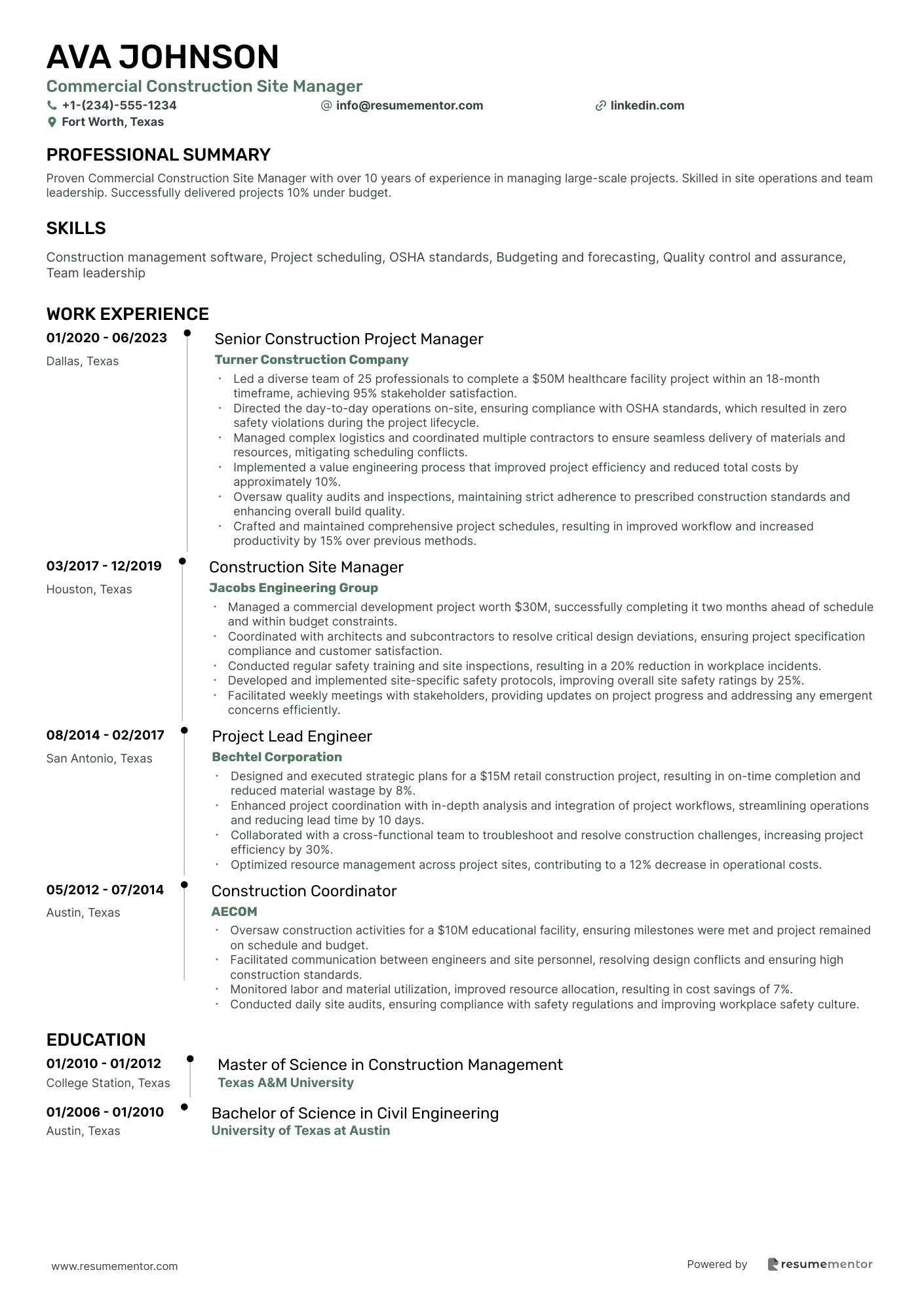
Commercial Construction Site Manager
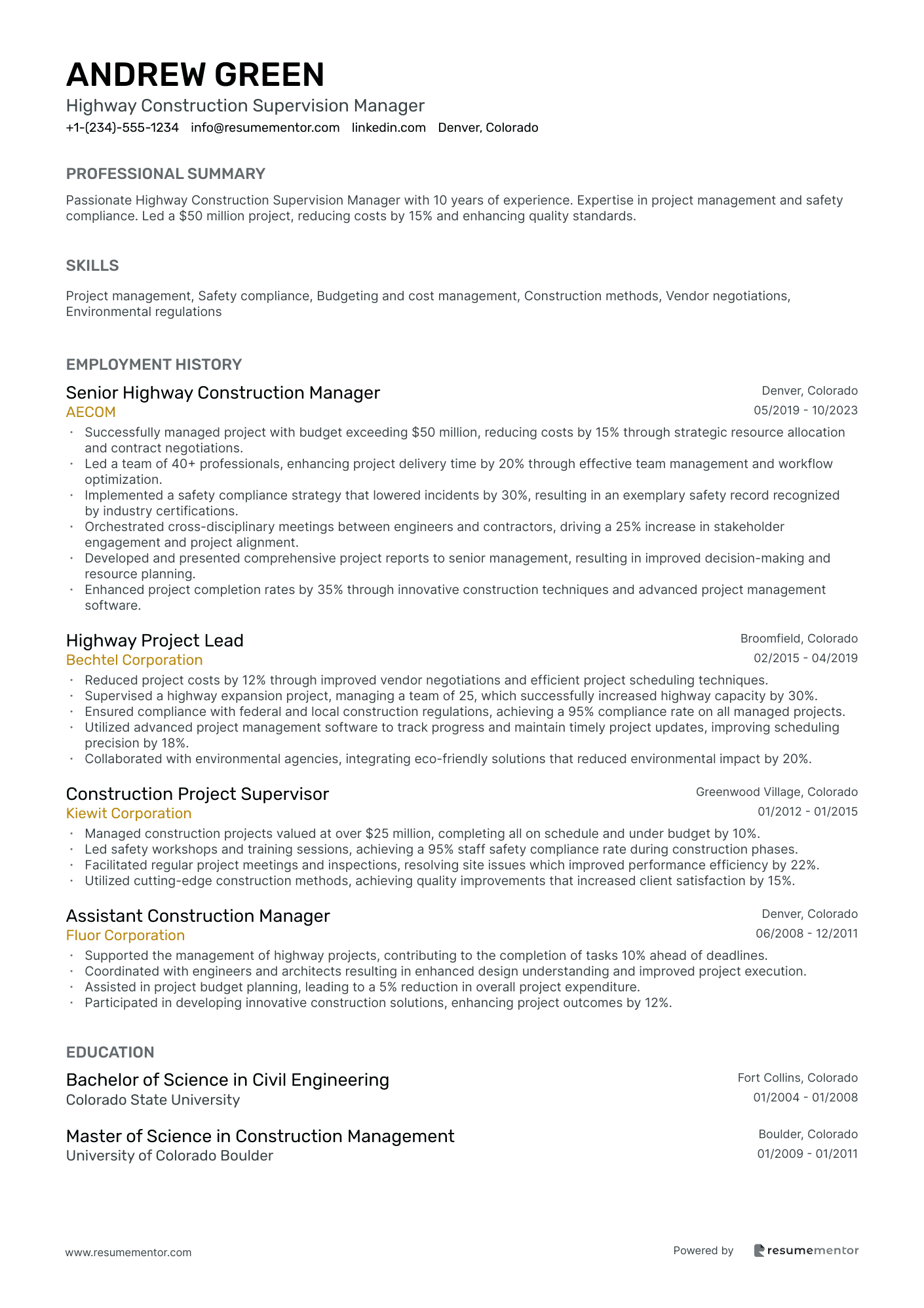
Highway Construction Supervision Manager
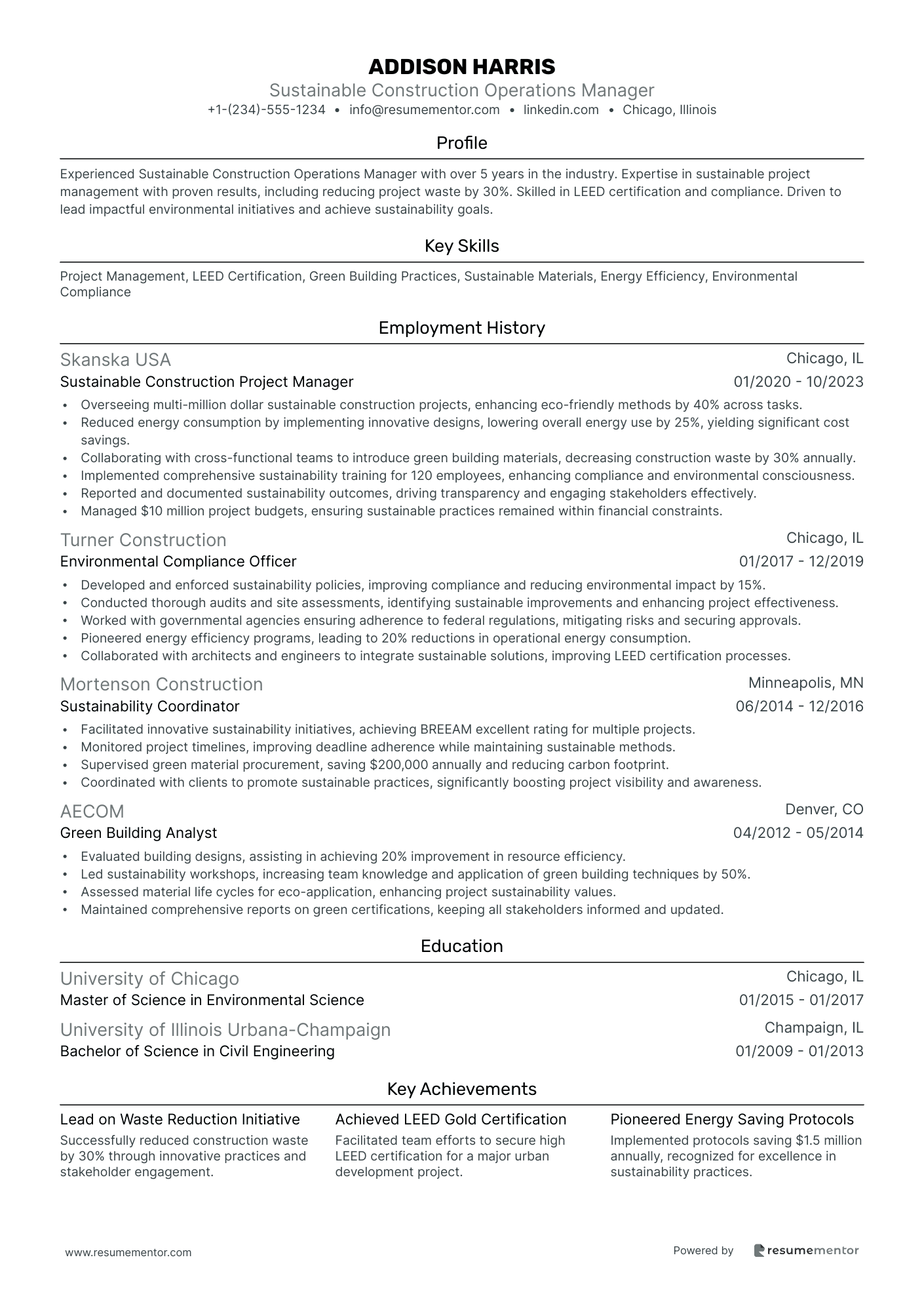
Sustainable Construction Operations Manager
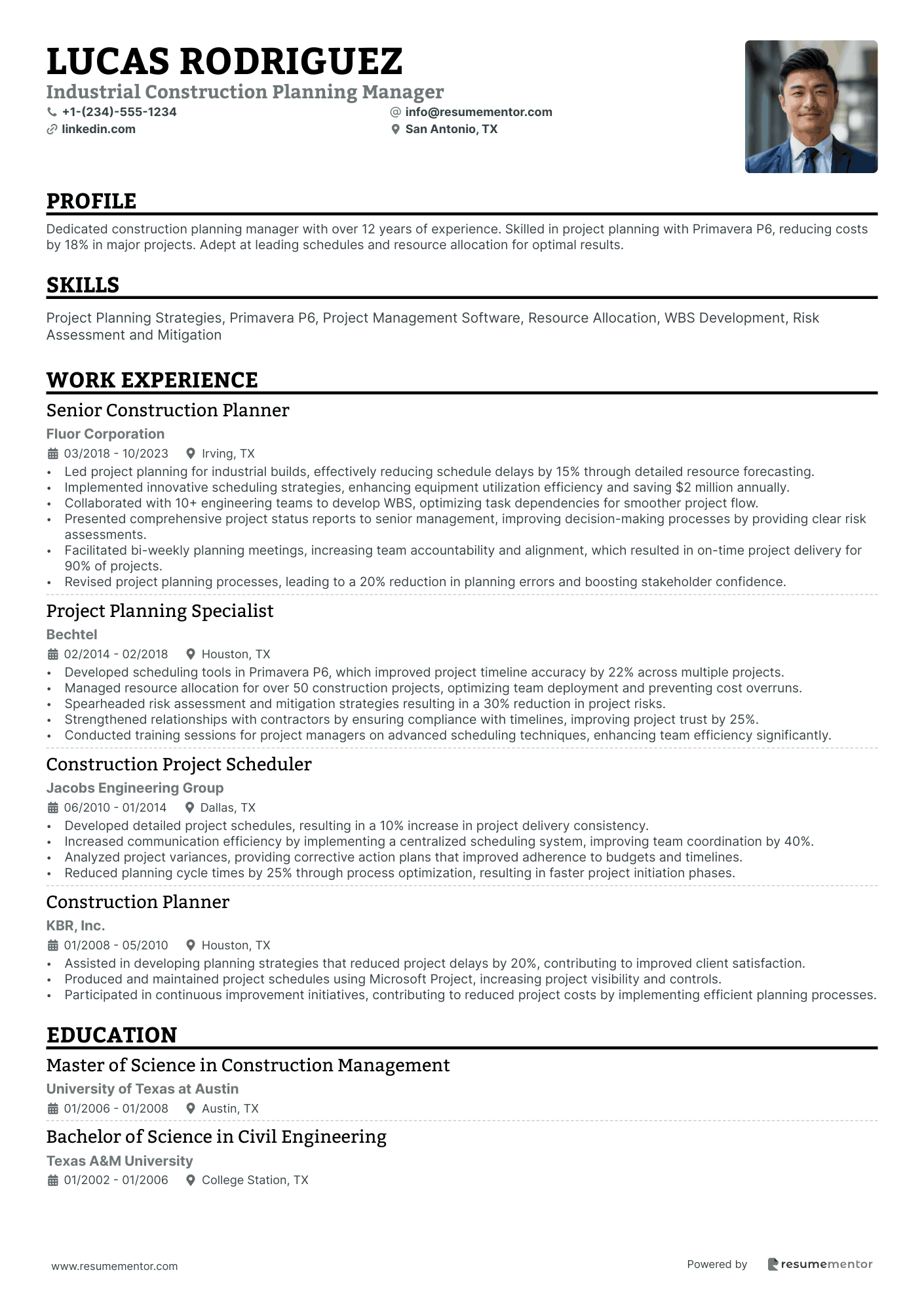
Industrial Construction Planning Manager
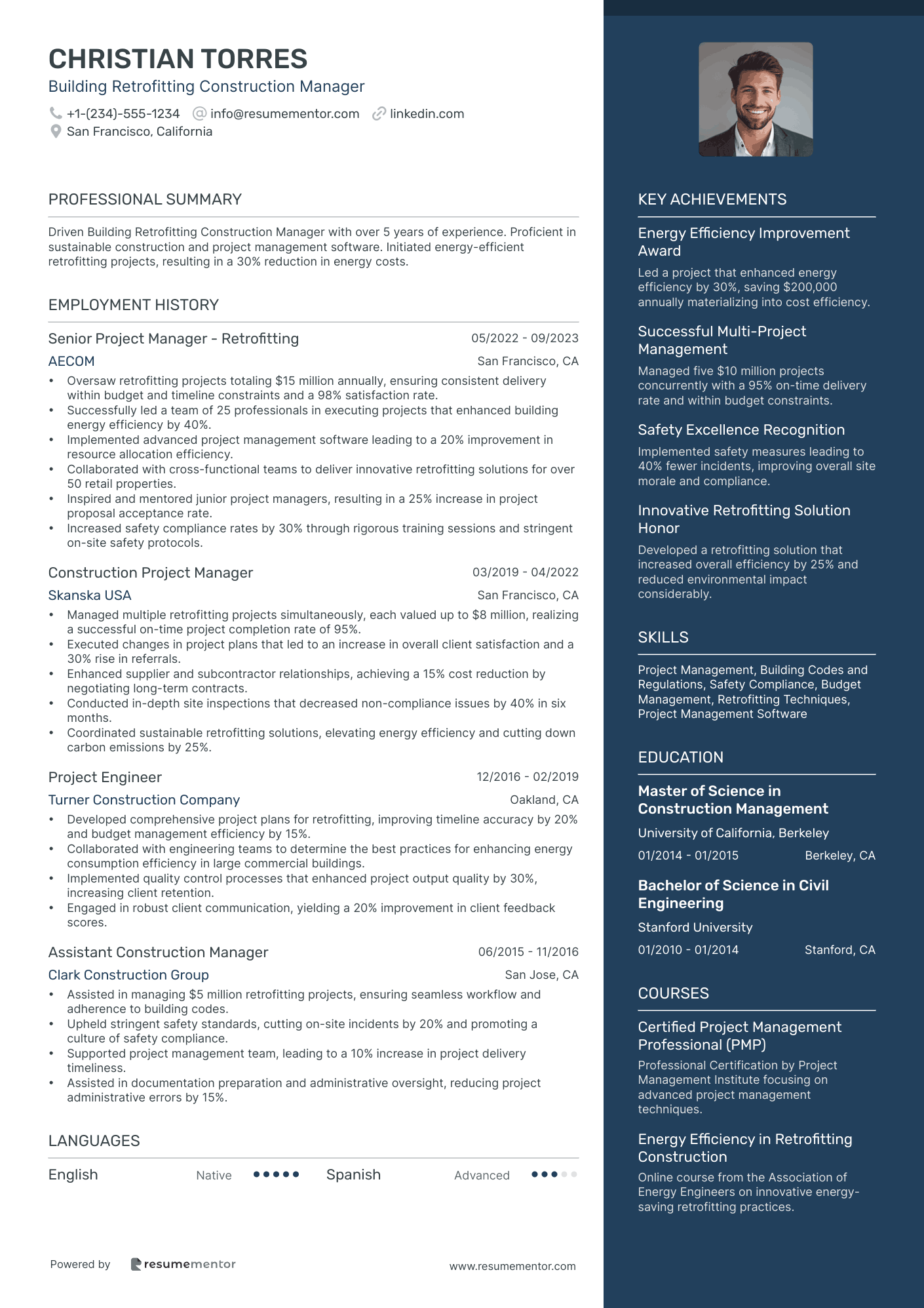
Building Retrofitting Construction Manager
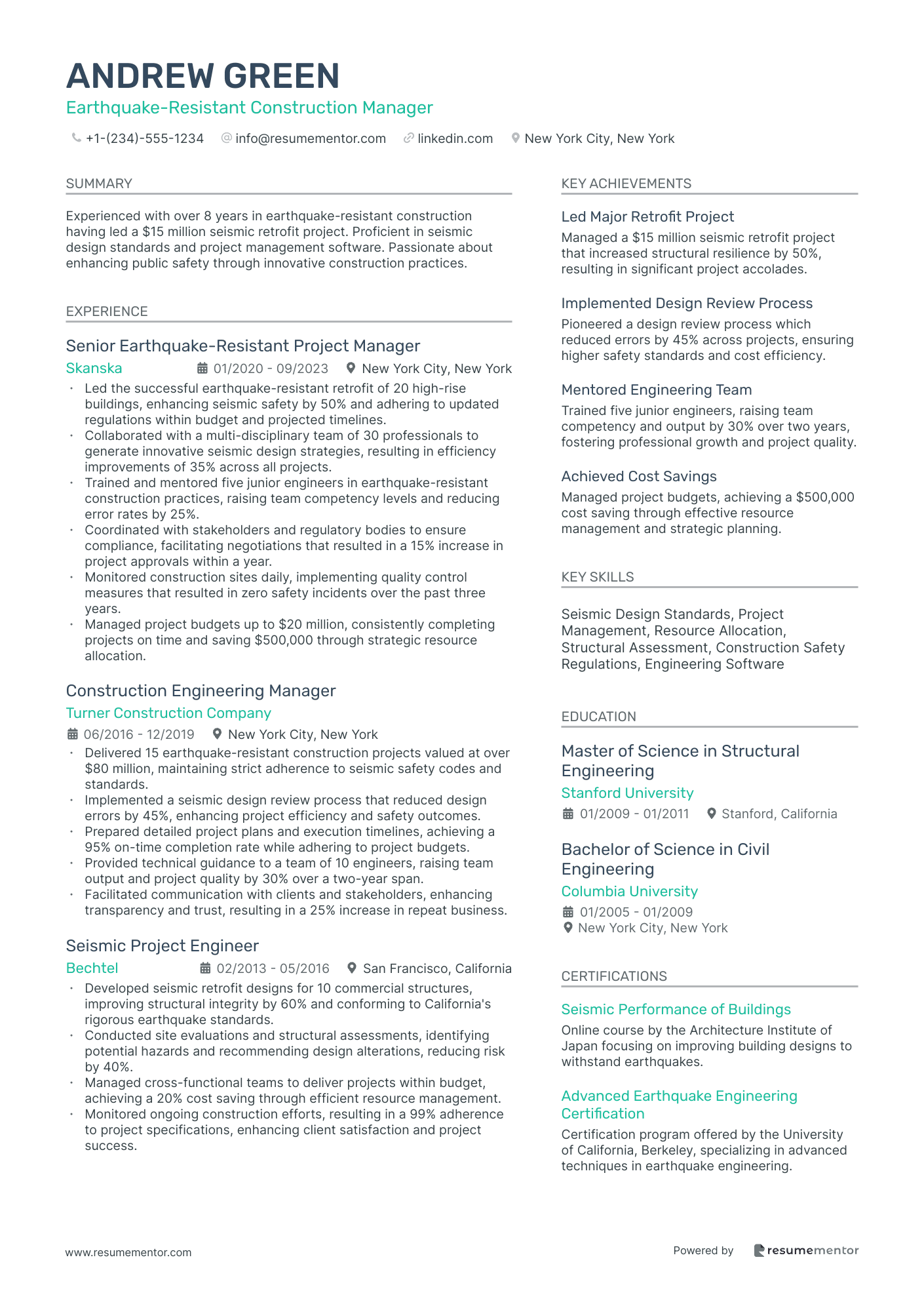
Earthquake-Resistant Construction Manager
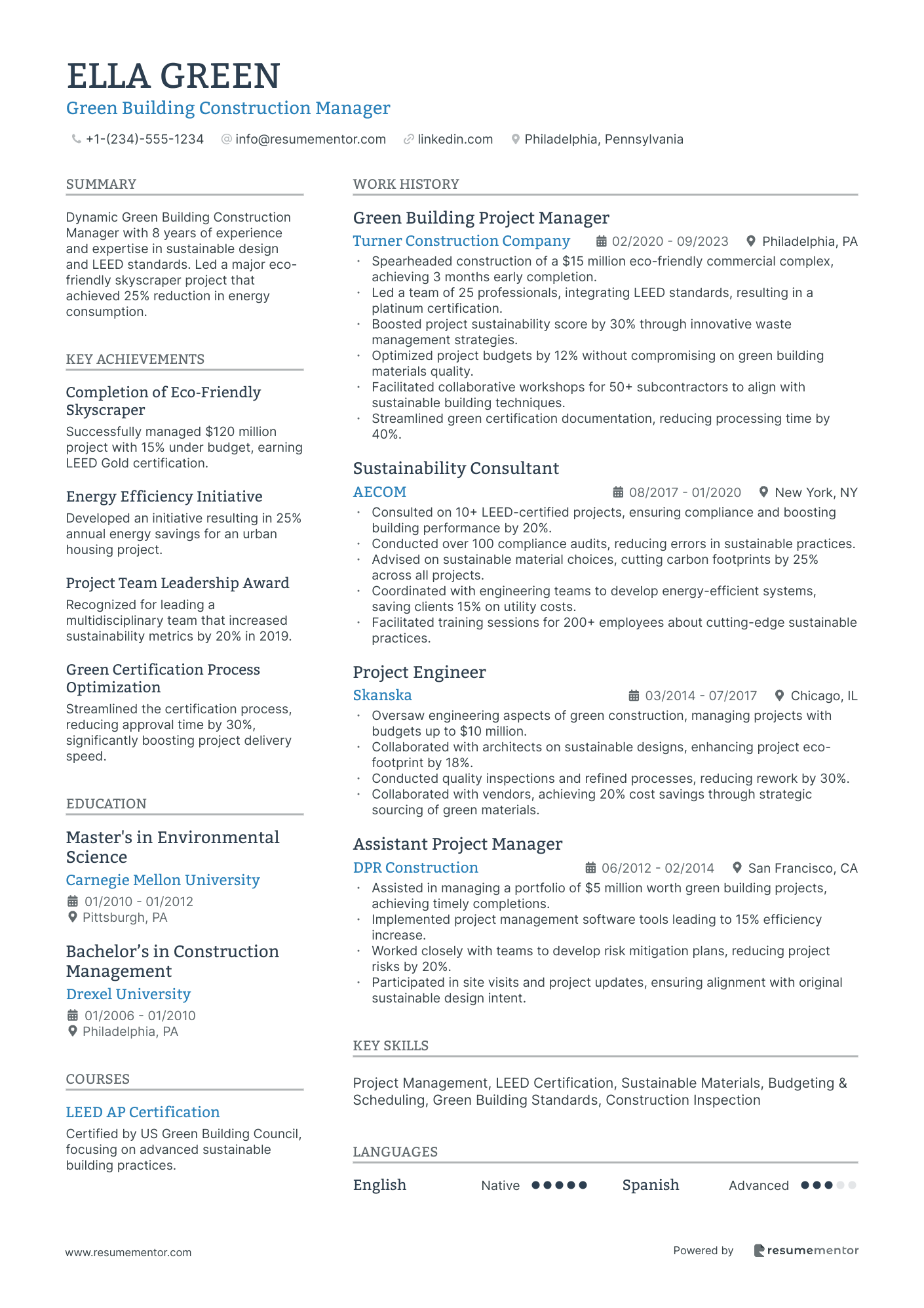
Green Building Construction Manager
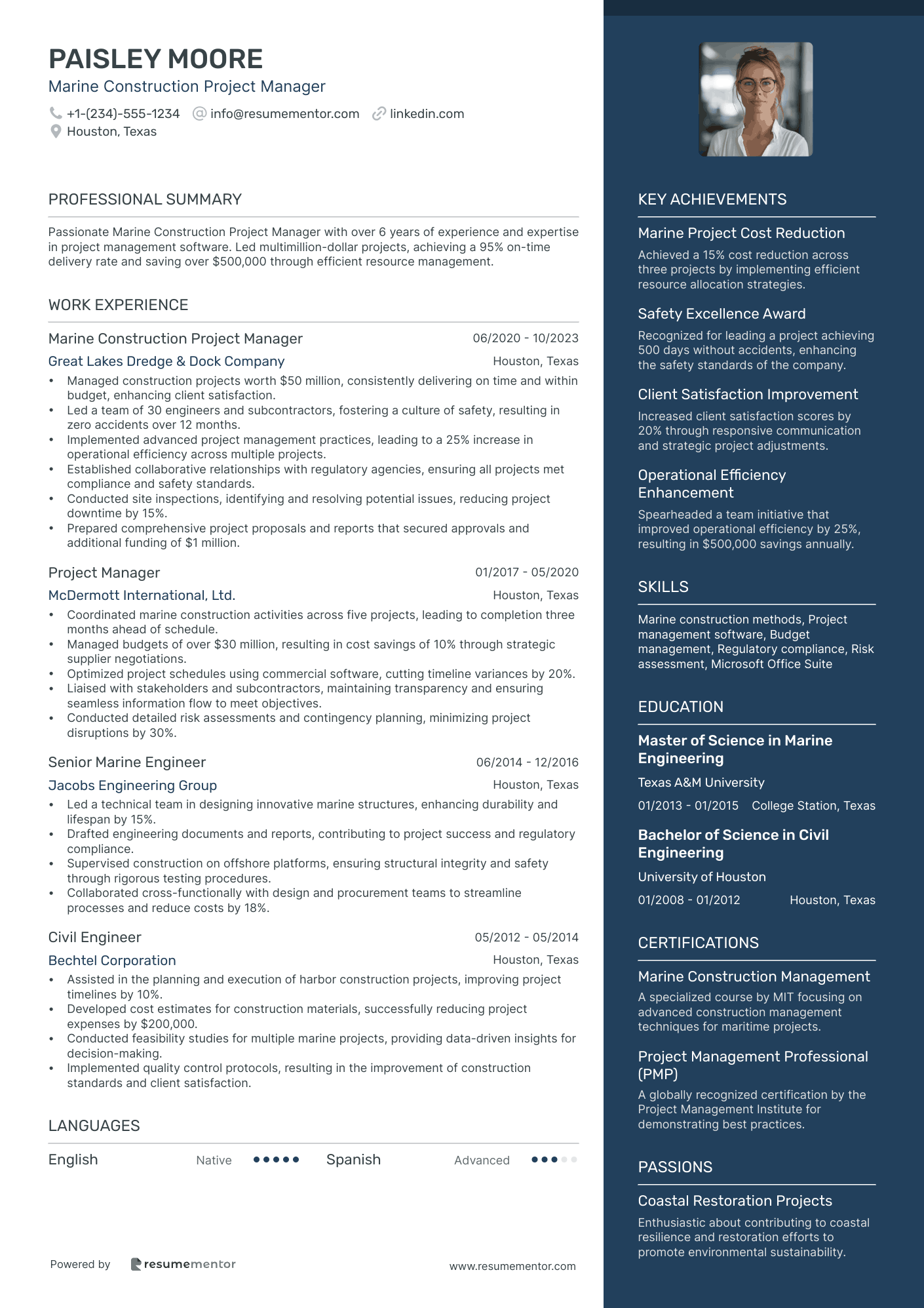
Marine Construction Project Manager

Civil Infrastructure Construction Manager resume sample
- •Led a $120 million municipal bridge project, ensuring completion two months ahead of schedule and under budget by 10%.
- •Implemented advanced project management tools, resulting in a 15% increase in coordination efficiency among teams.
- •Enhanced safety protocols which contributed to a 25% reduction in on-site accidents during the past year.
- •Managed cross-functional teams to optimize resource allocation, reducing material waste by 20%.
- •Collaborated with local authorities to secure necessary approvals, accelerating project timelines by three weeks.
- •Trained and mentored junior managers, improving team productivity and career growth potential by 30%.
- •Directed a $90 million wastewater treatment facility modernization project, leading to a 40% increase in processing capacity.
- •Streamlined project documentation processes, reducing paper use and documentation time by 50%.
- •Mitigated construction delays by implementing a proactive risk management strategy, keeping the project on track.
- •Facilitated successful collaboration with subcontractors, resulting in improved delivery times by 20%.
- •Developed and enforced robust quality-control protocols, enhancing project quality benchmarks.
- •Assisted in planning and execution of a $60 million public transportation expansion, enhancing service for over 1 million residents.
- •Generated detailed progress reports that improved stakeholder communication and transparency by 35%.
- •Coordinated logistics for multiple concurrent projects, decreasing redundancy and improving efficiency by 15%.
- •Conducted regular quality and safety inspections, resulting in improved compliance rates by 20%.
- •Overseen on-field operations for a road construction project, achieving a 95% user satisfaction rate upon completion.
- •Implemented a tracking system for resource management, reducing shortages and project delays by 15%.
- •Facilitated effective communication between engineering teams, improving project workflow and reducing misunderstandings.
- •Managed on-site teams to adhere to strict timelines, consistently achieving or exceeding project benchmarks.
Residential Construction Project Manager resume sample
- •Led the successful completion of a $25 million townhouse complex, reducing the projected timeline by 10% while maintaining quality standards.
- •Managed teams of subcontractors and suppliers efficiently to achieve a cost reduction of 15% through strategic sourcing.
- •Implemented advanced project management software, leading to a 20% increase in project tracking accuracy and efficient resource allocation.
- •Collaborated with architects and engineers to integrate sustainable design principles, resulting in a 30% decrease in energy usage.
- •Optimized client communications through regular updates and meetings, achieving a 95% client satisfaction rate.
- •Executed thorough site inspections and ensured full compliance with safety regulations, reducing onsite incidents by 25%.
- •Supervised the planning and execution of a 100-home residential project, completing it 6 weeks ahead of schedule.
- •Devised and maintained precise project budgets with variances under 5%, ensuring overall financial accuracy.
- •Conducted weekly site visits, which improved issue resolution times by 40% and kept project phases on track.
- •Built strong partnerships with subcontractors, increasing supplier performance ratings by 15% through enhanced engagement strategies.
- •Streamlined permit and inspection processes resulting in a 30% reduction in approval times, enabling smoother project progression.
- •Assisted in oversight of a 70-unit housing project, contributing to its on-time and under-budget delivery.
- •Facilitated communication between design and construction teams, leading to a significant drop in design-related errors by 20%.
- •Maintained comprehensive project schedules that improved coordination with teams and increased efficiency by 25%.
- •Promoted safety protocol initiatives, which resulted in achieving a zero-injury record for two consecutive years.
- •Directed daily operations of the construction site, achieving consistent progress reports and efficient workflow management.
- •Ensured adherence to safety standards and building codes, reducing non-compliance issues by 30% over two years.
- •Managed the on-site workforce effectively, increasing productivity rate by 15% through enhanced project allocation.
- •Prepared detailed project reports for senior management, leading to improved strategic decisions and project oversight.
Commercial Construction Site Manager resume sample
- •Led a diverse team of 25 professionals to complete a $50M healthcare facility project within an 18-month timeframe, achieving 95% stakeholder satisfaction.
- •Directed the day-to-day operations on-site, ensuring compliance with OSHA standards, which resulted in zero safety violations during the project lifecycle.
- •Managed complex logistics and coordinated multiple contractors to ensure seamless delivery of materials and resources, mitigating scheduling conflicts.
- •Implemented a value engineering process that improved project efficiency and reduced total costs by approximately 10%.
- •Oversaw quality audits and inspections, maintaining strict adherence to prescribed construction standards and enhancing overall build quality.
- •Crafted and maintained comprehensive project schedules, resulting in improved workflow and increased productivity by 15% over previous methods.
- •Managed a commercial development project worth $30M, successfully completing it two months ahead of schedule and within budget constraints.
- •Coordinated with architects and subcontractors to resolve critical design deviations, ensuring project specification compliance and customer satisfaction.
- •Conducted regular safety training and site inspections, resulting in a 20% reduction in workplace incidents.
- •Developed and implemented site-specific safety protocols, improving overall site safety ratings by 25%.
- •Facilitated weekly meetings with stakeholders, providing updates on project progress and addressing any emergent concerns efficiently.
- •Designed and executed strategic plans for a $15M retail construction project, resulting in on-time completion and reduced material wastage by 8%.
- •Enhanced project coordination with in-depth analysis and integration of project workflows, streamlining operations and reducing lead time by 10 days.
- •Collaborated with a cross-functional team to troubleshoot and resolve construction challenges, increasing project efficiency by 30%.
- •Optimized resource management across project sites, contributing to a 12% decrease in operational costs.
- •Oversaw construction activities for a $10M educational facility, ensuring milestones were met and project remained on schedule and budget.
- •Facilitated communication between engineers and site personnel, resolving design conflicts and ensuring high construction standards.
- •Monitored labor and material utilization, improved resource allocation, resulting in cost savings of 7%.
- •Conducted daily site audits, ensuring compliance with safety regulations and improving workplace safety culture.
Highway Construction Supervision Manager resume sample
- •Successfully managed project with budget exceeding $50 million, reducing costs by 15% through strategic resource allocation and contract negotiations.
- •Led a team of 40+ professionals, enhancing project delivery time by 20% through effective team management and workflow optimization.
- •Implemented a safety compliance strategy that lowered incidents by 30%, resulting in an exemplary safety record recognized by industry certifications.
- •Orchestrated cross-disciplinary meetings between engineers and contractors, driving a 25% increase in stakeholder engagement and project alignment.
- •Developed and presented comprehensive project reports to senior management, resulting in improved decision-making and resource planning.
- •Enhanced project completion rates by 35% through innovative construction techniques and advanced project management software.
- •Reduced project costs by 12% through improved vendor negotiations and efficient project scheduling techniques.
- •Supervised a highway expansion project, managing a team of 25, which successfully increased highway capacity by 30%.
- •Ensured compliance with federal and local construction regulations, achieving a 95% compliance rate on all managed projects.
- •Utilized advanced project management software to track progress and maintain timely project updates, improving scheduling precision by 18%.
- •Collaborated with environmental agencies, integrating eco-friendly solutions that reduced environmental impact by 20%.
- •Managed construction projects valued at over $25 million, completing all on schedule and under budget by 10%.
- •Led safety workshops and training sessions, achieving a 95% staff safety compliance rate during construction phases.
- •Facilitated regular project meetings and inspections, resolving site issues which improved performance efficiency by 22%.
- •Utilized cutting-edge construction methods, achieving quality improvements that increased client satisfaction by 15%.
- •Supported the management of highway projects, contributing to the completion of tasks 10% ahead of deadlines.
- •Coordinated with engineers and architects resulting in enhanced design understanding and improved project execution.
- •Assisted in project budget planning, leading to a 5% reduction in overall project expenditure.
- •Participated in developing innovative construction solutions, enhancing project outcomes by 12%.
Sustainable Construction Operations Manager resume sample
- •Overseeing multi-million dollar sustainable construction projects, enhancing eco-friendly methods by 40% across tasks.
- •Reduced energy consumption by implementing innovative designs, lowering overall energy use by 25%, yielding significant cost savings.
- •Collaborating with cross-functional teams to introduce green building materials, decreasing construction waste by 30% annually.
- •Implemented comprehensive sustainability training for 120 employees, enhancing compliance and environmental consciousness.
- •Reported and documented sustainability outcomes, driving transparency and engaging stakeholders effectively.
- •Managed $10 million project budgets, ensuring sustainable practices remained within financial constraints.
- •Developed and enforced sustainability policies, improving compliance and reducing environmental impact by 15%.
- •Conducted thorough audits and site assessments, identifying sustainable improvements and enhancing project effectiveness.
- •Worked with governmental agencies ensuring adherence to federal regulations, mitigating risks and securing approvals.
- •Pioneered energy efficiency programs, leading to 20% reductions in operational energy consumption.
- •Collaborated with architects and engineers to integrate sustainable solutions, improving LEED certification processes.
- •Facilitated innovative sustainability initiatives, achieving BREEAM excellent rating for multiple projects.
- •Monitored project timelines, improving deadline adherence while maintaining sustainable methods.
- •Supervised green material procurement, saving $200,000 annually and reducing carbon footprint.
- •Coordinated with clients to promote sustainable practices, significantly boosting project visibility and awareness.
- •Evaluated building designs, assisting in achieving 20% improvement in resource efficiency.
- •Led sustainability workshops, increasing team knowledge and application of green building techniques by 50%.
- •Assessed material life cycles for eco-application, enhancing project sustainability values.
- •Maintained comprehensive reports on green certifications, keeping all stakeholders informed and updated.
Industrial Construction Planning Manager resume sample
- •Led project planning for industrial builds, effectively reducing schedule delays by 15% through detailed resource forecasting.
- •Implemented innovative scheduling strategies, enhancing equipment utilization efficiency and saving $2 million annually.
- •Collaborated with 10+ engineering teams to develop WBS, optimizing task dependencies for smoother project flow.
- •Presented comprehensive project status reports to senior management, improving decision-making processes by providing clear risk assessments.
- •Facilitated bi-weekly planning meetings, increasing team accountability and alignment, which resulted in on-time project delivery for 90% of projects.
- •Revised project planning processes, leading to a 20% reduction in planning errors and boosting stakeholder confidence.
- •Developed scheduling tools in Primavera P6, which improved project timeline accuracy by 22% across multiple projects.
- •Managed resource allocation for over 50 construction projects, optimizing team deployment and preventing cost overruns.
- •Spearheaded risk assessment and mitigation strategies resulting in a 30% reduction in project risks.
- •Strengthened relationships with contractors by ensuring compliance with timelines, improving project trust by 25%.
- •Conducted training sessions for project managers on advanced scheduling techniques, enhancing team efficiency significantly.
- •Developed detailed project schedules, resulting in a 10% increase in project delivery consistency.
- •Increased communication efficiency by implementing a centralized scheduling system, improving team coordination by 40%.
- •Analyzed project variances, providing corrective action plans that improved adherence to budgets and timelines.
- •Reduced planning cycle times by 25% through process optimization, resulting in faster project initiation phases.
- •Assisted in developing planning strategies that reduced project delays by 20%, contributing to improved client satisfaction.
- •Produced and maintained project schedules using Microsoft Project, increasing project visibility and controls.
- •Participated in continuous improvement initiatives, contributing to reduced project costs by implementing efficient planning processes.
Building Retrofitting Construction Manager resume sample
- •Oversaw retrofitting projects totaling $15 million annually, ensuring consistent delivery within budget and timeline constraints and a 98% satisfaction rate.
- •Successfully led a team of 25 professionals in executing projects that enhanced building energy efficiency by 40%.
- •Implemented advanced project management software leading to a 20% improvement in resource allocation efficiency.
- •Collaborated with cross-functional teams to deliver innovative retrofitting solutions for over 50 retail properties.
- •Inspired and mentored junior project managers, resulting in a 25% increase in project proposal acceptance rate.
- •Increased safety compliance rates by 30% through rigorous training sessions and stringent on-site safety protocols.
- •Managed multiple retrofitting projects simultaneously, each valued up to $8 million, realizing a successful on-time project completion rate of 95%.
- •Executed changes in project plans that led to an increase in overall client satisfaction and a 30% rise in referrals.
- •Enhanced supplier and subcontractor relationships, achieving a 15% cost reduction by negotiating long-term contracts.
- •Conducted in-depth site inspections that decreased non-compliance issues by 40% in six months.
- •Coordinated sustainable retrofitting solutions, elevating energy efficiency and cutting down carbon emissions by 25%.
- •Developed comprehensive project plans for retrofitting, improving timeline accuracy by 20% and budget management efficiency by 15%.
- •Collaborated with engineering teams to determine the best practices for enhancing energy consumption efficiency in large commercial buildings.
- •Implemented quality control processes that enhanced project output quality by 30%, increasing client retention.
- •Engaged in robust client communication, yielding a 20% improvement in client feedback scores.
- •Assisted in managing $5 million retrofitting projects, ensuring seamless workflow and adherence to building codes.
- •Upheld stringent safety standards, cutting on-site incidents by 20% and promoting a culture of safety compliance.
- •Supported project management team, leading to a 10% increase in project delivery timeliness.
- •Assisted in documentation preparation and administrative oversight, reducing project administrative errors by 15%.
Earthquake-Resistant Construction Manager resume sample
- •Led the successful earthquake-resistant retrofit of 20 high-rise buildings, enhancing seismic safety by 50% and adhering to updated regulations within budget and projected timelines.
- •Collaborated with a multi-disciplinary team of 30 professionals to generate innovative seismic design strategies, resulting in efficiency improvements of 35% across all projects.
- •Trained and mentored five junior engineers in earthquake-resistant construction practices, raising team competency levels and reducing error rates by 25%.
- •Coordinated with stakeholders and regulatory bodies to ensure compliance, facilitating negotiations that resulted in a 15% increase in project approvals within a year.
- •Monitored construction sites daily, implementing quality control measures that resulted in zero safety incidents over the past three years.
- •Managed project budgets up to $20 million, consistently completing projects on time and saving $500,000 through strategic resource allocation.
- •Delivered 15 earthquake-resistant construction projects valued at over $80 million, maintaining strict adherence to seismic safety codes and standards.
- •Implemented a seismic design review process that reduced design errors by 45%, enhancing project efficiency and safety outcomes.
- •Prepared detailed project plans and execution timelines, achieving a 95% on-time completion rate while adhering to project budgets.
- •Provided technical guidance to a team of 10 engineers, raising team output and project quality by 30% over a two-year span.
- •Facilitated communication with clients and stakeholders, enhancing transparency and trust, resulting in a 25% increase in repeat business.
- •Developed seismic retrofit designs for 10 commercial structures, improving structural integrity by 60% and conforming to California's rigorous earthquake standards.
- •Conducted site evaluations and structural assessments, identifying potential hazards and recommending design alterations, reducing risk by 40%.
- •Managed cross-functional teams to deliver projects within budget, achieving a 20% cost saving through efficient resource management.
- •Monitored ongoing construction efforts, resulting in a 99% adherence to project specifications, enhancing client satisfaction and project success.
- •Participated in the design and planning for earthquake-resistant infrastructure projects, contributing to a 25% increase in project safety ratings.
- •Assisted in the development of earthquake-resistant guidelines, ensuring all projects met or exceeded regulatory standards and received necessary approvals.
- •Engaged in research and development of new materials and methods for earthquake resilience, leading to a 15% enhancement in project durability.
- •Coordinated with local authorities and inspections to ensure compliance, facilitating smoother approvals and increased project throughput.
Green Building Construction Manager resume sample
- •Spearheaded construction of a $15 million eco-friendly commercial complex, achieving 3 months early completion.
- •Led a team of 25 professionals, integrating LEED standards, resulting in a platinum certification.
- •Boosted project sustainability score by 30% through innovative waste management strategies.
- •Optimized project budgets by 12% without compromising on green building materials quality.
- •Facilitated collaborative workshops for 50+ subcontractors to align with sustainable building techniques.
- •Streamlined green certification documentation, reducing processing time by 40%.
- •Consulted on 10+ LEED-certified projects, ensuring compliance and boosting building performance by 20%.
- •Conducted over 100 compliance audits, reducing errors in sustainable practices.
- •Advised on sustainable material choices, cutting carbon footprints by 25% across all projects.
- •Coordinated with engineering teams to develop energy-efficient systems, saving clients 15% on utility costs.
- •Facilitated training sessions for 200+ employees about cutting-edge sustainable practices.
- •Oversaw engineering aspects of green construction, managing projects with budgets up to $10 million.
- •Collaborated with architects on sustainable designs, enhancing project eco-footprint by 18%.
- •Conducted quality inspections and refined processes, reducing rework by 30%.
- •Collaborated with vendors, achieving 20% cost savings through strategic sourcing of green materials.
- •Assisted in managing a portfolio of $5 million worth green building projects, achieving timely completions.
- •Implemented project management software tools leading to 15% efficiency increase.
- •Worked closely with teams to develop risk mitigation plans, reducing project risks by 20%.
- •Participated in site visits and project updates, ensuring alignment with original sustainable design intent.
Marine Construction Project Manager resume sample
- •Managed construction projects worth $50 million, consistently delivering on time and within budget, enhancing client satisfaction.
- •Led a team of 30 engineers and subcontractors, fostering a culture of safety, resulting in zero accidents over 12 months.
- •Implemented advanced project management practices, leading to a 25% increase in operational efficiency across multiple projects.
- •Established collaborative relationships with regulatory agencies, ensuring all projects met compliance and safety standards.
- •Conducted site inspections, identifying and resolving potential issues, reducing project downtime by 15%.
- •Prepared comprehensive project proposals and reports that secured approvals and additional funding of $1 million.
- •Coordinated marine construction activities across five projects, leading to completion three months ahead of schedule.
- •Managed budgets of over $30 million, resulting in cost savings of 10% through strategic supplier negotiations.
- •Optimized project schedules using commercial software, cutting timeline variances by 20%.
- •Liaised with stakeholders and subcontractors, maintaining transparency and ensuring seamless information flow to meet objectives.
- •Conducted detailed risk assessments and contingency planning, minimizing project disruptions by 30%.
- •Led a technical team in designing innovative marine structures, enhancing durability and lifespan by 15%.
- •Drafted engineering documents and reports, contributing to project success and regulatory compliance.
- •Supervised construction on offshore platforms, ensuring structural integrity and safety through rigorous testing procedures.
- •Collaborated cross-functionally with design and procurement teams to streamline processes and reduce costs by 18%.
- •Assisted in the planning and execution of harbor construction projects, improving project timelines by 10%.
- •Developed cost estimates for construction materials, successfully reducing project expenses by $200,000.
- •Conducted feasibility studies for multiple marine projects, providing data-driven insights for decision-making.
- •Implemented quality control protocols, resulting in the improvement of construction standards and client satisfaction.
Looking for your next construction manager position? You handle blueprints and budgets with ease, but when it comes to detailing your career on paper, you hit a brick wall. Mapping out your professional specialism—whether it’s residential, commercial, or infrastructure—isn’t the problem. Covering everything from your knowledge of local regulations to demonstrating your adherence to budgets can be tough.
What’s more, since you pull long hours on site, you may struggle to build a professional network. Expanding your connections and finding new contacts is a savvy way to learn about new opportunities.
In the following guide, we’ll share the best way to plan and create your next construction manager resume.
Key takeaways
- Focus on showcasing your leadership, project oversight, and operational management skills, highlighting your ability to deliver projects on time, within budget, and in compliance with regulations.
- Use metrics to demonstrate your achievements, such as successful project completions, cost savings, and safety improvements, to provide concrete evidence of your impact.
- Include certifications like PMP, LEED, or OSHA, and make sure to prioritize those that are most relevant to the role you're applying for.
- Highlight your proficiency with industry-specific software, including tools like Buildertrend, Autodesk BIM 360, and Sage Estimating, to show you're technologically adept.
- Organize your resume using a reverse-chronological format. Include sections such as work experience, education, certifications, skills, and additional accomplishments like volunteer work or professional affiliations.
How to use this Construction Manager resume guide
Designed to showcase your leadership, project management, and operational expertise, this guide equips you with tools, tips, and examples specific to the construction management field.
You’ll learn how to stand out in a competitive job market and streamline the process with our resume builder, ensuring a polished and professional finish.
- Begin with the introduction to understand the unique aspects of construction management resumes.
- Review the key takeaways for quick insights specific to the construction industry.
- Follow the section-by-section layout to build a resume that showcases your project management skills and technical expertise.
- Use our resume builder to easily incorporate construction-specific terminology and skills.
- Learn from real-world examples of successful construction manager resumes.
- Focus on tips and highlights that emphasize safety, efficiency, and budget management.
- Tailor your resume to demonstrate your ability to handle large-scale projects and align with the specific needs of the employer.
- Refer to trusted resources for the latest trends and standards in construction resume expectations.
- Apply what you’ve learned to ensure your resume stands out in competitive job markets.
- Save and regularly update your progress as you gain more experience and certifications.
With this guide and our resume builder, you’ll have all the tools you need to craft a resume that emphasizes your leadership, project management, and technical expertise.
What to focus on when writing your Construction Manager resume
Don’t waste any time. Your construction manager resume must immediately showcase your leadership, project oversight, and operational management expertise. Share your ability to manage construction projects, comply with safety and building regulations, and deliver projects on time and within budget.
Is your resume good enough?
Drop your resume here or choose a file.
PDF & DOCX only. Max 2MB file size.
Highlight specific project achievements
Avoid vague statements and instead focus on specific project achievements. Wherever possible, add metrics to claims. Numbers and percentages allow you to illustrate the impact of your hard labor. Pick a few exemplary accomplishments and include them when writing about work experience on your resume.
Led a cross-functional team to complete a $5M commercial construction project three weeks ahead of schedule, reducing labor costs by 10% and earning client commendation for exceptional efficiency.
Include the right certifications
Showcasing certifications like PMP, LEED, or OSHA can be tricky. It’s a challenge to highlight them effectively without sounding repetitive or overly technical. Many job seekers struggle to decide which certifications are most relevant to prioritize for a specific role.
PRO TIP
Review the job advert first. Often, the criteria will outline “must have” qualifications for construction managers. Start by including these on your resume. You can then add any additional certificates that align well with the demands of the vacancy.
Showcase your software experience
The construction industry heavily relies on modern technology. Let the hiring manager know you’re a whiz with certain programs and systems. Examples of the software you may want to list include Buildertrend, Autodesk BIM 360, Sage Estimating, Primavera P6, and iAuditor.
Show, don’t tell
Don’t make the mistake of simply listing the software you use. Provide some context, too. For example, you may want to mention a program in your work experience section and describe how it helped you to excel. Give as many examples as possible.
Highlight your problem-solving skills
Construction managers have to be innate problem-solvers. However, it’s no good simply saying that you’re a “problem-solver”. You need to show it (and detail the impact your creativity had!). One way you can do that is by discussing a situation in which you used this skill and what happened as a result.
- Resolved significant scheduling conflicts and resource shortages on a $7M residential development project by implementing a revised workflow plan, completing the project on time, cutting projected delays, and ensuring client satisfaction.
How to choose the right resume format
Next, you need to choose the right format for your construction manager resume. We recommend the reverse-chronological format most of the time. This is the standard approach in the U.S., so hiring managers expect to see it.
This resume format details your professional history in reverse order. That means your most recent experience goes at the top of each section. As you move down, you also go backward in time.
As a general rule, your construction manager resume should include these sections:
- Contact Information
- Professional Summary
- Work Experience
- Education
- Certifications and Licenses
- Skills
- Projects or Case Studies
- Professional Affiliations
If you’re unsure how to outline your next resume, we have a selection of resume templates you can use. Select the right one for your job search and fill it with your most recent information.
How should you save your resume file?
It’s smart to save your resume file as a PDF rather than a Word Document.
Do I need to include volunteer experience?
You don’t need to include volunteer experience on your resume, although you may choose to. This is particularly useful if you lack other work experience.
Should I include a photo on my construction manager resume?
Typically, the answer is no. There’s no need to include a headshot or other photos on your resume.
How can I make sure my resume passes the Applicant Tracking System (ATS)?
Don’t believe the hype about ATS software. While many employers use this program to filter incoming resumes, it’s not as powerful as you may think. However, you can include keywords and phrases from the original job advert to help.
What to include in your resume header
Next up, you need to create a clear resume header. This section works like a business card and includes your name, job title, and contact details.
List the following:
- Your name: Start with your first and last name.
- Acronyms: Show off your certificates by adding acronyms after your name. Examples include PMP, CCM, and CMAA.
- Job title: Add the same job title as the role you’re applying for.
- Contact details: Write your professional email address and business phone number.
- Location: You shouldn’t add your entire address
If your LinkedIn is up-to-date and active, include a hyperlink to it in your resume header. That way, the hiring manager can quickly and easily connect with you there.
How to write a resume summary
Your resume summary sits at the top of the page. It’s a short paragraph, similar to an elevator pitch highlighting your top achievements, awards, and talents. Use concise language and powerful action verbs when writing this section of your resume.
Consider what makes you unique. For example, reflect on the specific skills you've developed.
Here are some questions to ask yourself:
- Are you skilled in project management?
- Do you have a knack for ensuring projects are completed on time and within budget?
- What’s your most impressive skill and how has it been applied?
- Do you have construction certifications that align with this role?
- What software are you a pro at using in your field?
Before you start writing your summary, check the job advert. Tailor this section to meet the needs of the vacancy at hand to give yourself the best chance of success.
The above summary hits the mark. It accentuates the construction manager's experience. Boasting key accomplishments, showing off their ability to handle big projects, and detailing their accolades, it’s a stellar example. It also includes vital details by highlighting specific achievements with numbers, key software skills, and important certifications.
How to write a quantifiable resume experience section
Writing about your work experience on a resume is an important part of the process. If you’ve had a long, illustrious career in construction, now’s the time to shout about it. Once again, you should use the reverse chronological order—starting with your most recent position at the top of the section.
Don’t go back more than 10-15 years in the past. This experience is no longer relevant and can lead to age discrimination. Equally, you only need to list positions that relate directly to the vacancy. Ensure your language is simple, straightforward, and easy for the hiring manager to understand.
Action verbs
Using specific action words can help your experience stand out. Words like "led," "managed," "improved," and "achieved" can make your accomplishments more noticeable. Aim to showcase your skills by quantifying your achievements instead of listing responsibilities.
Your work experience section should include:
- Company name and location
- Your official job title
- Dates of employment
- Bullet-pointed achievements
Remember to tailor your experience—particularly the accomplishments you share—to the job listing. Consider the demands of the role and write bullet points that speak directly to them.
- •Successfully managed $50M+ worth of residential and commercial projects, completing 95% of them on time and under budget.
- •Implemented Lean construction techniques, reducing waste and increasing project efficiency by 18%.
- •Led a team of 30+ workers, improving safety protocols and reducing workplace injuries by 25% year-over-year.
- •Streamlined project communication using Procore and Bluebeam, resulting in a 20% increase in team collaboration and fewer delays.
- •Developed and maintained strong client relationships, achieving a 95% client satisfaction rate on all projects.
Focussing on successful project management, team leadership, cost savings, and software use, the above is an excellent example. The use of metrics and specific details means that a hiring manager would instantly be able to see what the candidate brings to the table.
Moreover, the language is simplified and easy to read regardless of whether you have a construction background or not. By steering clear of industry-specific jargon, this example is accessible to everyone.
Construction Manager resume experience samples
If you’re not sure where to get started, we’ve got you covered. There are many strategies you can employ while writing your experience section.
Here are some resume examples you can use for yourself:
Achievement-focused sample
Are you a real go-getter? If you've adhered to budgets, smashed timelines, and excelled at every feat, include these details in your work experience section. As always, you should add metrics to the mix. These work as evidence, backing up the big, impressive claims you make.
- •Directed the successful execution of 20+ high-value projects worth over $60M, delivering each on time and under budget, driving a 25% boost in client retention rates.
- •Reduced overall project costs by 15% by renegotiating contracts and implementing Lean construction practices, saving the company over $7M annually.
- •Leveraged Procore and Bluebeam software to optimize workflows, leading to a 22% increase in efficiency and a reduction in construction delays by 20%.
- •Built lasting client relationships, resulting in a 98% client satisfaction rate and securing an additional $12M in repeat business over the last 2 years.
Software-focused example
Can you use a diverse range of construction software? Are you a technological whiz-kid? If so, you should use this as your unique selling proposition (USP) when applying for positions. Mention the software that you use and how you use it. Wherever possible, add facts, statistics, and details to back up your points.
- •Managed the successful completion of 25+ construction projects valued at $70M, consistently delivering projects on time and under budget, resulting in a 30% increase in client retention and repeat business.
- •Utilized Procore for project scheduling, budgeting, and document management, leading to a 25% improvement in project efficiency and reducing delays by 20%. Streamlined workflows that reduced project overhead by 12%.
- •Implemented Bluebeam Revu for digital plan review and collaboration, cutting manual takeoff time by 35%, allowing the team to focus on value-added tasks and improving project delivery speed.
- •Built lasting relationships with clients, achieving a 96% satisfaction rate and securing $15M in repeat business over the last three years, contributing to consistent company growth.
Responsibility-specific focused example
As a manager, you have a ton of responsibility. The success of any construction project rests on your shoulders. Remind the hiring manager of this fact and focus on how you led teams toward success. Include details about your past triumphs and the responsibilities you faced along the way.
- •Held full responsibility for overseeing 30+ large-scale projects worth over $80M, ensuring they were delivered on time, under budget, and met all quality standards.
- •Led cross-functional teams of up to 60 people, coordinating efforts across construction, design, and subcontractor teams to meet tight deadlines, resulting in a 25% reduction in project delays.
- •Drove safety initiatives that reduced workplace accidents by 40% through regular training, inspections, and adherence to OSHA safety regulations, ensuring a safe working environment for all crew members.
- •Cultivated strong client relationships, directly resulting in $18M in repeat business and a 98% satisfaction rate, solidifying long-term partnerships and enhancing the company’s reputation.
Listing your skills on your resume
Next, you’ve got to decide what skills to put on your resume. Construction managers wear many hats—not just a hard hat. You’ll be in charge of budgeting, project planning and scheduling, team leadership, operations management, and even conflict resolution. However, it doesn’t end there.
You should also include knowledge-based skills, including any software you use at a professional level. While we’ve already covered some options, additional programs include Procore, Bluebeam Revu, and CoConstruct. If any are mentioned in the job advert and you know them, be sure to list them.
Don’t forget to tailor your resume skills section to the job advert. Comb through the core criteria and check for any hard (i.e. technical) and soft skills you already have under your belt. Adding these to your list of skills may instantly increase your chances of getting to the interview stage of the process.
Best hard skills to feature on your Construction Manager resume
Hard skills are the foundation of your role as a construction manager. If you don’t get these right, there’s no way you can deliver results and complete large-scale projects. Of course, there’s a wide range of hard skills you may list. These include financial management, budget adherence, business intelligence, and data analysis. Think about which make you stand out and were listed on the job advert.
Best soft skills to feature on your Construction Manager resume
Every manager has to deal directly with their team. It’s your job to make sure that every employee does their part. To keep things ticking over, you’ll need a selection of soft skills. These are often harder to identify—and certainly harder to quantify. However, they are entirely necessary for the job.
How to include your education on your resume
If you want to land that all-important interview, you’ll need to list education on your resume. Use the reverse chronological order once again.
Here are some of the qualifications you may consider:
- Academic background: Feature any degrees, diplomas, or other formal qualifications you have. You should only include your GPA (3.5 and above) if it’s exceptional and puts you in a good light.
- Professional training: Add professional certificates, such as OSHA Training, Forklift and Heavy Equipment Operation, and Hazardous Materials Handling (HAZWOPER) Training.
- Software certificates: Do you have any certificates in the software you’ve used? If you’ve completed courses in them, it may be smart to add them. List the date you achieved them and whether you’ve continued your training.
Extra sections to include in your Construction Manager resume
Building a compelling construction manager resume involves more than just listing your work experience. You want to show that you’re a well-rounded person. To do that, you can include your skills, languages, hobbies, volunteer work, and even the books you've read, that showcase your strengths and interests.
Language section
Working with international businesses? If so, your language skills may come into play. Mention any languages you speak and your proficiency level, such as "Fluent in Spanish." This skill may help you to stand out from the crowd.
Hobbies and interests section
What do you do outside of the workplace? Only include hobbies and interests that demonstrate relevant skills like "Woodworking" or "DIY projects.” Every hobby you include should speak to the vacancy. For example, if your interest is in “Celebrity Culture,” that has nothing to do with construction work.
Volunteer work section
Before you landed your first construction manager role, you may have completed some volunteer experience. Should that be the case, you can include an entire section dedicated to it. Add in any skills you developed or achievements you gained during this experience.
- •Provided strategic guidance to foster economic development in the community
- •Organized annual business summits that attracted over 500 local entrepreneurs
- •Mentored aspiring nonprofit leaders in strategic planning and operational efficiency
- •Helped mentees secure $150,000 in grants through targeted fundraising strategies
- •Led volunteer teams in constructing homes for low-income families
- •Streamlined volunteer onboarding process, reducing preparation time by 30%
PRO TIP
Don’t add sections for the sake of it! When you’re thinking about including these additional sections, think about what they tell the reader about you. If you’re lacking in space on your resume, avoid adding information that could be considered “fluff.”
Conclusion
By this point, you should be ready to ace your Construction Manager resume. Be sure to tailor your resume to meet the needs of the vacancy. Show off your relevant experience, back it up with metrics, and use simplistic language. Generally speaking, you should use the reverse chronological order.
If in doubt, use our resume builder tool to effortlessly create the perfect application for the job.
Related Articles

Continue Reading
Check more recommended readings to get the job of your dreams.
Resume
Resources
Tools
© 2026. All rights reserved.
Made with love by people who care.

